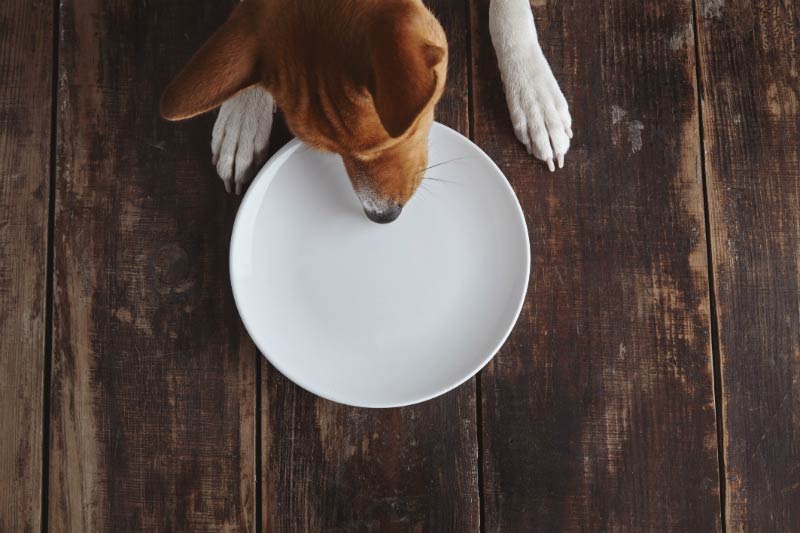What Can I Give My Dog for Diarrhea and Gas
Dogs, like people, can be afflicted with stomach problems, including indigestion, diarrhea, and gas. Although severe or prolonged symptoms should always be treated by a veterinarian, minor cases of stomach upset or diarrhea can be cared for at home with "people" medications that are safe for dogs. If symptoms persist or if you've never given a food or medication mentioned below to your dog, call your veterinarian.
OTC Medications Safe for Treating GI and Stomach Problems in Dogs
Pepto-Bismol (bismuth subsalicylate) is safe to offer most dogs, but AKC's Chief Veterinary Officer Dr. Jerry Klein says he rarely recommends it because the salicylates in the medication could cause gastric bleeding, and the bismuth in the medication can turn the stool black, which may mask any resulting gastric bleeding. "If it must be given, offer no more than one or two doses after consulting with your veterinarian," he says. Your veterinarian may instead recommend the bismuth subsalicylate product formulated for dogs, called Corrective Suspension. Dogs with bleeding disorders and dogs who are pregnant or nursing should not take any form of bismuth subsalicylate, nor should dogs taking non-steroidal anti-inflammatory agents such as Rimadyl and Deramaxx. Cats should never be given bismuth subsalicylate, as it is toxic to them.
- Pepto-Bismol Dosage For Dogs: The recommended dosage is 1 teaspoon for every 10 pounds, according to Dr. Klein. It can be offered to the dog every 6-to-8 hours, but if your dog still has diarrhea after a few doses, stop the medication and call your veterinarian. Also, if you've never given Pepto-Bismol to your dog before, check with your veterinarian to confirm the dosage.
- How to administer Pepto-Bismol to Dogs : Use an empty (no needle) plastic syringe to give your dog the medication. Open his mouth, place the empty syringe toward the back of the tongue and push the plunger, then hold his muzzle for a second to ensure he swallows it.

Imodium (loperamide) is another over-the-counter medication dogs can take, which also helps resolve diarrhea. Dogs with certain conditions and dogs taking certain medications should not be given Imodium, so check with your veterinarian before administering it. Cats may have a reaction to this medication—ask for veterinary guidance before offering it to a feline.
- Imodium Dosage For Dogs: A dog can take one 2-milligram pill per 40 pounds of body weight two-to-three times a day, says Dr. Klein. Call your veterinarian first to verify dosage. Do not offer this medication for more than two days. If symptoms persist, seek veterinary care.
- How to administer Imodium to Dogs: Give the tablet to your dog in a pill pocket (the Greenies™ brand is recommended) or wrapped in a bit of food (like cheese). Use only enough food to hide the taste of the pill or you may risk further irritating your dog's stomach.

Pepcid (famotidine): If your pet has issues with stomach acid build-up, gastric ulcers, or other stomach- or GI-related issues, many veterinarians recommend this. Although this medication has not been FDA-approved for use in pets, it's considered standard practice for veterinarians to recommend its use in certain dogs and cats. Contact your veterinarian before administering—it may not be recommended if your pet is pregnant or nursing or has a medical condition.
- Pepcid Dosage for Dogs: For both dogs and cats, the dosage is one 10-milligram tablet for a 20-pound dog every 12-to-24 hours, says Dr. Klein. It is best to give this medication one hour before meals. Check with a veterinarian to verify the dosage is accurate for your pet. Also, if purchasing Pepcid, make sure to buy Pepcid Original Strength (10 milligram tablets). Pepcid Complete contains additional active ingredients, and Pepcid Maximum Strength contains more medication per tablet.
- How to Administer Pepcid to Dogs: It's not recommended to give Pepcid with food, as it can lessen its efficacy. Instead tilt your dog's head back, place the pill on the back of the tongue, hold the mouth shut for a moment, and gently stroke the throat or blow on the nose to induce swallowing. If you do not have experience giving pills to your dog without a treat, contact your veterinarian for advice.
Certain foods, such as pumpkin and rice, can also help with stomach issues in dogs. Learn more about that here.
Dr. Klein says he's also prescribed probiotics to treat diarrhea, such as Pro-Viable or Fortiflora. "If diarrhea is not severe, results are noticed within 24 hours," he says. Consult with your veterinarian about acquiring similar products.
What Can I Give My Dog for Diarrhea and Gas
Source: https://www.akc.org/expert-advice/health/is-pepto-bismol-safe-for-dogs/
0 Response to "What Can I Give My Dog for Diarrhea and Gas"
Post a Comment